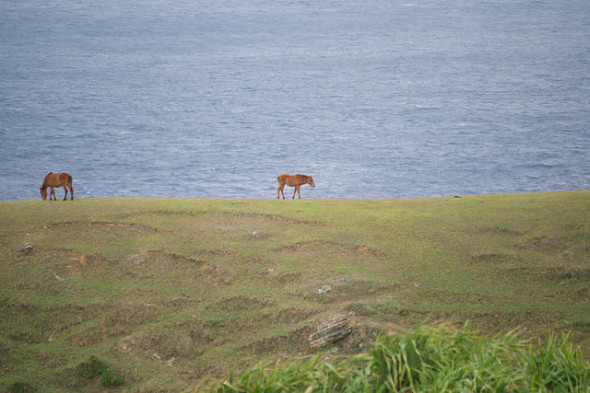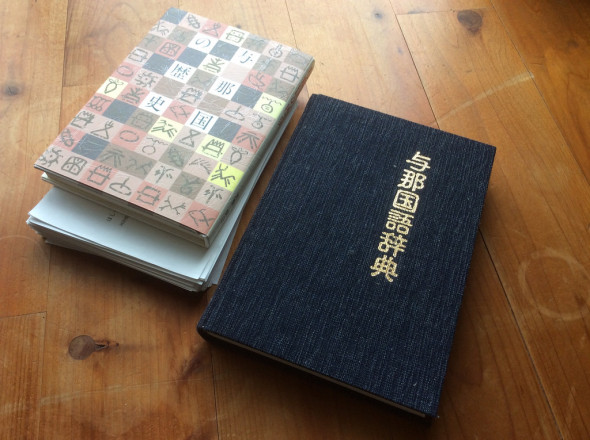When the weather conditions are right on Yonaguni, an island lining the west border of the country, Taiwan can be seen from the northwest beach. Yonaguni isn’t just close to Taiwan, the distances from it to places like the Philippines and Vietnam aren’t much different from the distance to Kumamoto. Yes, Japan is much thinner than you may think.
Five years ago, a friend of mine who lived in the center of Tokyo moved to this island because she wanted to live alongside horses. There are about 100 wild, indigenous horses called Yonaguni horses living like this on a farm on the edge of the island.
When she came back to Tokyo to visit, she said: “It’s kind of boring how all the publishing companies are in Tokyo. It might be fun if I made a publishing company on an island right on the edge of the country.” They say many a true word is spoken in jest, and sure enough, she actually published a book in March 2012. The name of her company is kadibooks, and right now, she’s in the process of preparing her second.

Five minutes from her room, there’s a cliff with a monument that reads “The hill where you can see the last sunset in Japan.” When I sat there and watched the sun set, staring far past the sea, I thought about how the sun is always rising and setting somewhere around the Earth. So then what exactly did they mean by ‘last?’
Taiwan lies on the other side. Beyond here, people don’t speak Japanese, which makes this the farthest Japanese publishing company to the west. On this island, though, there exists another language: Dunan munui. On mainland Japan, it’s seen as a type of Okinawan dialect, but UNESCO counts it as a completely different language from Japanese. There doesn’t seem to be a fine line with which to completely separate languages from dialects, but while Japanese and the Ryukyu languages correlate very closely with one another, they share less vocabulary words than English and German do.
Here’s what I found on the UNESCO Site.
There are eight minority languages in Japan:
Ainu (Hokkaido)
Amami
Hachijo
Kunigami
Miyako
Okinawan
Yaeyama
Yonaguni (Dunan munui)
Every language on that list aside from Ainu is a Ryukyu language, and they all use different vowels. It’s hard to get an exact count of how many people can currently speak Yonaguni, which only has 3 vowels (i/u/a), but as of 2010, the number stood at a little less than 400 people, making it a severely endangered language. Yonaguni even has its own system of picture writing known as Kaida letters, which was used up until the Meiji Period.
It’s also said that the Ryukyu languages are offshoots of the old Japanese language, since they still have words that use the ‘p’ sound that existed 7 centuries ago, such as ‘pitou’ (person) and ‘pikai’ (light in the Miyako language). Even though they all exist on the same island, the language is so different from one village to the next that people can hardly communicate with each other.

According to Y, a young singer who’s working to record the Sunkani songs of Yonakuni, there are traces of word diffusion from Yonaguni to Ryukyu, and from Japan to Ryukyu, like the waves that flow in and out from the shore. Perhaps this just means there’s more than one ‘Japanese language.’
After quitting my job, coming to the ‘edge’ of Japan, and turning 41, I didn’t just get lost, I had the ladder pulled right out from me, and completely lost sense of what is and isn’t ‘Japanese.’ Will I be able to make it to the other side? Will I be able to go on studying English?
Just like how people had to study ‘standard’ Japanese or Yonaguni history in order to survive, we’re seeing more and more people who are now studying English in order to survive. Perhaps Japanese itself is in the process of becoming a ‘local language.’
■In Japan’s Okinawa, saving indigenous languages is about more than words(The Washington Post 2014/11/29配信)
The Tsumukiumu Editorial Office:
Raised in Chiba, living in Tokyo. I’m looking for a path of words that will let me wander as I please without any suffocating restrictions. I’ve helped out with the “Horse Words Notebook” published by kadibooks on Yonaguni.

